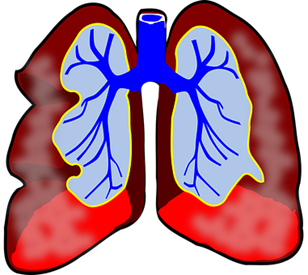Lifestyle Changes to Ease the Effects of Lung Disease
 Those affected by COPD are likely to be told by their doctor that there are a number of lifestyle changes they can make to slow the progression of the disease, which has no current cure. Many of these actions are small alterations to their daily lives that can have a positive impact.
Those affected by COPD are likely to be told by their doctor that there are a number of lifestyle changes they can make to slow the progression of the disease, which has no current cure. Many of these actions are small alterations to their daily lives that can have a positive impact.
The following tips are offered by Dr. David Samadi, chief of robotic surgery at Lenox Hill Hospital, and medical contributor for the Fox News Channel’s Medical A-Team. They provide several key factors for helping improve the lives of those living with COPD, helping them breathe easier while slowing the condition
Clean your house – regularly: Dust, secondhand smoke and fumes from paint or other household chemicals are all irritants to lungs. Cleaning your house regularly helps reduce the irritants that make COPD worse. The activity also allows you to get a little exercise. Too, never let anyone smoke in your home. No only does that not come out easily, it’s horrible for your health.
Get some exercise: Before you even begin any sort of exercise routine – even cleaning your house – consult with your doctor, who is likely to encourage you to participate in activities that aren’t too strenuous. Regular exercise typically helps reduce symptoms of depression and may even give you energy than without it. But don’t overdo it, because too much exercise can be dangerous. Take physical activities at a slow pace at least three to four times each week.
Lose weight and stop drinking soda: In line with any exercise, attempt to lose weight by putting a stop to drinking unhealthy soda and other non-nutritious foods. According to Dr. Samadi, “weight gain can be one side effect of consuming soda, but another effect of carbonated beverages is stomach swelling. As your stomach expands, it pushes up against your diaphragm, making it harder to breathe.” Thus, choose healthier beverages, such as water, unsweetened tea, green tea or even coffee.
Stay hydrated – with water: Drink lots of water. Remaining well-hydrated is crucial to managing COPD. Without enough water, “your mucus can become thick, sticking to your lung and adding to the burden of being able to breathe well,” Dr. Samadi says. Try to drink between eight to 10 cups of water daily.
Make healthy food choices: Maintaining a healthy diet is essential. Eating junk food contributes to weight gain, which leads to trouble breathing and slows your ability to exercise. Junk food is also usually loaded with salt, which causes fluid retention resulting in congestion that can obstruct breathing. Choose fruits, vegetables, whole grains, low-fat dairy, nuts and seeds, beans, seafood and lean sources of poultry and beef. Doing so will likely lead to you enjoying your food more, too, as it likely tastes better.
Keep your oxygen with you: Wherever you go, your oxygen tank needs to go too—don’t leave home without it. Low oxygen levels can put an extreme strain on the heart, and the perception of a lack of oxygen can create a tremendous amount of mental and physical stress, which can lead to poor choices.
COPD is a chronic lung condition so it can be challenging and stressful to deal with. Meeting regularly and talking with others who have COPD can help you feel less alone. Sharing your feelings and experiences, and hearing others’ thoughts, can teach you better ways to cope with your chronic condition.

